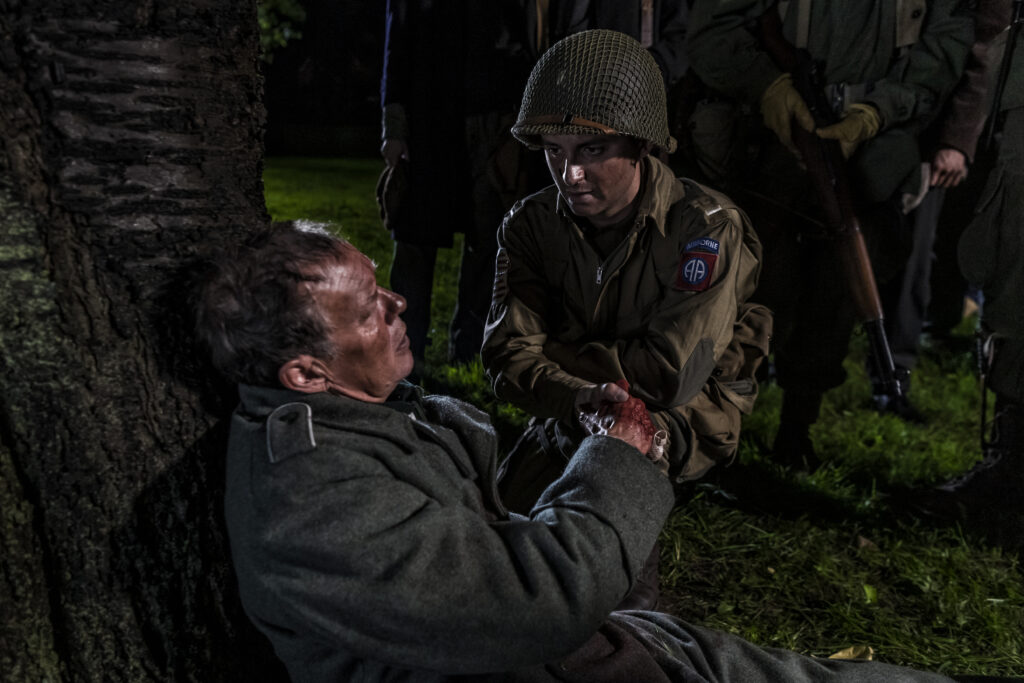Film based on true history.

The story is based on actual history. Examples of true stories are, for example, the ‘Men’s Island’. The enclave of men, civilians and soldiers, who stayed behind near the town of Lent when the majority of the women and children were evacuated. And of course the deliberate flood, also known as ‘Operation Stork’ of ‘Fallstorch’, plays an important role. The blowing up of dikes in the Betuwe, in December 1944, ensured that the land was flooded. From Kleve in Germany to the Amsterdam-Rhine Canal. We want to highlight the battle at Hemmen and Zetten Castle and the bombing of Huissen will be part of it as well.
After Operation Market Garden failed in September 1944, a six-month period of intense fighting followed between the Allies who liberated Nijmegen and the Germans who refused to give up their hold on Arnhem. For many, it is an unknown chapter of Dutch history during World War II. Between these cities, civilians of the agricultural region of the ‘Betuwe’ were caught in the crossfire and deliberately flooded land. They had to leave their hearth and home, or even assist soldiers in the gathering of food and resources.
AC Films is making a new short feature film in collaboration with Exodus-Huissen and various re-enactment associations. They consciously choose not only to portray the military perspective in the film, but also the experiences of the civilians of the Betuwe.
Filmmaker Bram van Workum: ‘a story to be told’
Bram van Workum, director and owner of AC Films, has always been fascinated by the Second World War. When he was in the Betuwe for several film projects he met Martien van Hemmen, chairman of the Exodus Huissen foundation. Martien told him about the last winter of war and how the civilians in the Betuwe had suffered. Around 40 to 50 percent of the Betuwe had been completely destroyed. But this episode of the second World War in the Betuwe is not engrained in the collective memory of the Dutch.
Bram immediately saw a story that has to be shared, as a film. With the death of the last veterans, it is the task of our generation to continue remembering the war. We can use all kinds of documented – and therefore true – stories as a backdrop for the film. Bram believes that with a feature film we can reach a new and also younger audience, for example for the commemoration of 75 years of freedom in the Netherlands in 2020
Story short film Reconciliation
The scene that we filmed for the Freedom Museum is about a true story about a meeting between an allied and a German lieutenant in October 1944. G-company of the American 508th parachute regiment lay in an orchard between Huissen and Bemmel, waiting for possible German patrols. The German patrol headed for the American lines was then ambushed. All thirty Germans were killed except one. This seriously injured captain begged for his life in English. An American lieutenant went over with his sergeant. They placed the German captain with his back against the trunk of an apple tree. The dying man spoke to the Americans for an hour and a half about home and that he had been a professor before the war. They gave him cigarettes and – against their better judgment – water, out of compassion for being so horribly thirsty.
The American lieutenant later said he was sorry to see the German die. This story recalls history and represents the reconciliation between the two sides that faced each other during World War II.
Film story full-length feature film
The above scenes are part of the great film story that follows Johannes Crekel. Crekel is a local villager who must carefully navigate this perilous time to try and safeguard what remains of his family and village. Little does he know that his fate will come down to a basic choice between justice and revenge. Will he be able to push the chaos aside and make the right choice?
